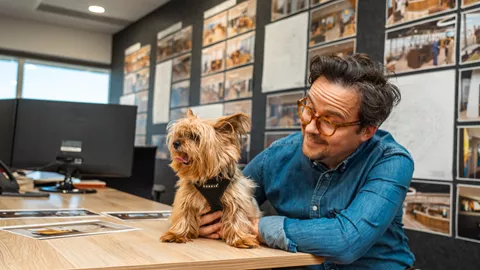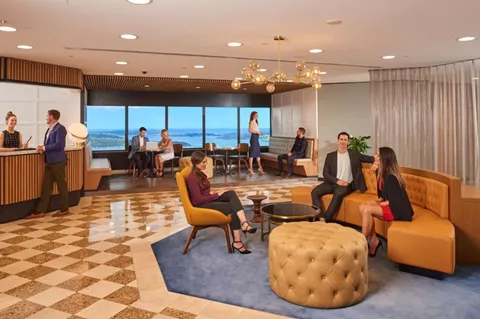Rational Living Inc - Saima Salman
Is this where you thought you would end up?
Absolutely! My journey as a Clinician started during my early teens while studying psychology in Pakistan back in the late 80s. It all started with me picking up a book from my college library, written by the father of Cognitive Behaviour Therapy, Dr. Albert Ellis (A Guide to Rational Living). This book not only changed my life but also my whole philosophy about life, others, and myself. I managed to overcome my severe height phobia, perfectionism (obsessive-compulsive personality traits); symptoms related to post-traumatic stress, and other disturbances by simply reading his self-help books. They helped me not only recognize the root cause of my problems but also showed me a fairly logical and easy way to fix them. I was hooked! I read and re-read it for two years until I turned 18 and was a significantly different person.
My conviction in the model runs deep. I knew for a fact that if I could help myself so much as a teenager, without any professional training or outside psychological support, I would be able to save so many by formally getting trained in the model. By the time I finished the book, I was absolutely clear that I wanted to become a Clinical Psychologist and not just any Psychologist, but a Psychologist personally trained by the author of the book that changed my life: Dr. Ellis himself. I was dreaming BIG and even though there were people who thought it was a tall order for a young Muslim girl coming from a third world country, but my parents believed in me and encouraged me to do what it takes to make it there and I did! I had already finished my Masters in Psychology, post-Masters specialization in Clinical Psychology, and was working as a Clinician in Pakistan by the time I applied for the fellowship at the Albert Ellis Institute in New York City. I was selected for the fellowship program mainly because of my personal journey, as well as my research paper on Islam and Rational Emotive Cognitive Behaviour Therapy. Dr. Ellis wrote a personal note to me about what he loved about my paper and to date, this is one of my most prized possessions. This particular paper is very close to my heart because this was something I came up with when I was still very young and also because it helped Dr. Ellis change his mind about Islam as a religion. I was one of the two people who were finally selected for the prestigious Post Doctoral Fellowship Program at the Albert Ellis Institute in 2000. I clearly saw myself there at the age of 17 and I know for a fact that this was my true calling.
What do you consider your biggest weakness?
I feel too much – it’s a blessing and a curse! I have definitely come very far and over the years, I have worked very hard to manage my empathy. In other words, I have learned to anchor it a lot better. During my Clinical training, I used to be marked negatively for having too much empathy and also because I used to sometimes cry more than my patients – yes, not good for the patients! It has also improved because rather than feeling overwhelmed and sad (as I used to as a novice trainee) now I actually feel excited as a seasoned clinician when I meet a new client because I am confident that his/her life will turn around in a few months!
What advice would you give to the next generation of female leaders?
This topic is very close to my heart because I am genuinely passionate about issues related to women, considering I successfully broke free from the third world patriarchal narrative myself at a very young age. I feel women still have so much to learn about self-love and self-compassion and have a long way to go when it comes to the guilt associated with not fulfilling one role or the other.
I would tell them to learn to not care too much about being ‘good enough’ because if you continue to aspire to be "good enough", the definition of “good enough” will always change to suit someone’s opinion or twisted expectation. I would suggest that women would be significantly better off, if they can learn to focus on being ‘happy’ rather than focus on being ‘good enough’ by changing the internal self-rating game (Am I good enough? - as a professional, mother, daughter, sister, boss, co-worker and the list goes on) into a definitive affirmation: I am GOOD and I am ENOUGH! It is basically learning to validate and accept themselves unconditionally rather than constantly trying to look for validation and approval from others.
Bottom line: My advice is to think about choosing between these two options: “am I good enough?” OR “I am good and I am enough" --- not perfect, just good and enough — the answer will decide your emotional destiny!
What is one core message you received from your mentors?
I would like to share one of my favourite quotes here that summarizes everything that I have learned from Dr. Ellis and the rest of my mentors. The Thai Buddhist master, Ajahn Chah put the idea this way: “if you want the duck to be a chicken and the chicken to be a duck, you are really going to suffer”. Indeed, part of accepting life for what it is means accepting – not liking! Accepting that there are many bad actors out there, who sometimes say/do hurtful things. Rational thinking teaches us that we don’t’ have to be blown away by their bad behaviour or become irrational as a response to their unkindness. We always have a choice – a choice to stay calm and be good problem solvers or a choice to be upset and sign up for poor outcomes. Either way, the situation never changes, no matter how upset you are! People don’t change because you want them to. People change only when they choose to change. You have no control over how others choose to treat you or what life throws at you. The only part of the universe you do have control over is YOU – how you choose to think, feel and respond is up to you! Choose wisely!
What is an accomplishment that you are proudest of?
My proudest achievement to date is surprisingly not my various degrees or other significant external achievements that the world can see. My proudest accomplishment was my ability to fight the societal narrative around women as a young girl growing up in Pakistan. I am extremely proud of how I was raised like a fireball by my father in a predominantly patriarchal society. He was a man way ahead of his time, an exceptionally intelligent and progressive liberal. It was not easy to learn to stand up tall, speak up and raise all hell for the right reasons, regardless of the resistance, name-calling (you are so ‘aggressive’, ‘defiant’, 'confrontational' etc.), and ongoing judgment. These were the very things not acceptable in Pakistan back in the 1980s – “good” women were supposed to be quiet, submissive, and compliant. I was not ok with that narrative so I decided to become who I thought I wanted to be and I have never looked back. I owe it all to my father, who firmly believed that I could set my eyes on anything I wanted to achieve and that my voice was important enough to be heard! He taught me how to fight the system by teaching me a very different philosophy. According to my dad, learning to stand up and speak up for others and myself was not an act of defiance as perceived by those I stood up against, but rather a much-needed act of self-care!
Contact Us
If you’ve got any questions call us 1300 409 755 or fill in your information below and we’ll get back to you shortly.






